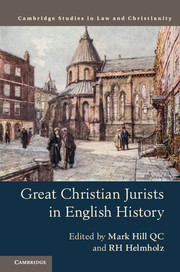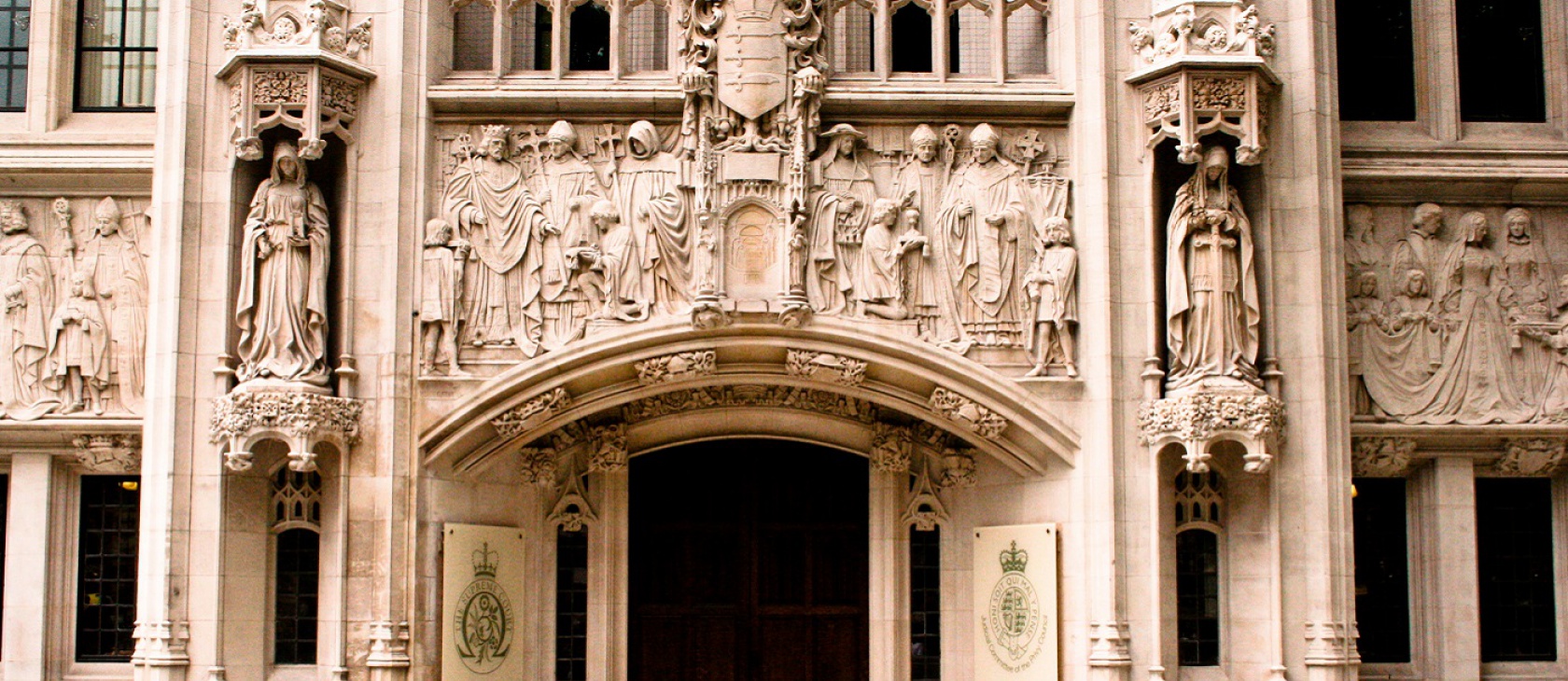Great Christian Jurists in English History. M. Hill, QC, and R.H. Helmholz, eds.
Cambridge: Cambridge University Press, 2017. 353 pages.
 There are several reasons why a scholarly work on the formidable role of Christian jurists in English history is both valuable and timely. The English legal system and common law have long been widely admired worldwide. They are associated with justice, efficiency, fairness, and indeed with a common-sense outlook produced by a focus on real-life problems. Less well-known and appreciated is the cardinal role played by Christian beliefs and believers in their development. As this role becomes more tenuous, it is unclear whether this heralds perhaps a new direction for the common law when it will be invigorated by fresh sources of inspiration – or whether it is sailing into uncharted waters without a meaningful rudder or anchor.
There are several reasons why a scholarly work on the formidable role of Christian jurists in English history is both valuable and timely. The English legal system and common law have long been widely admired worldwide. They are associated with justice, efficiency, fairness, and indeed with a common-sense outlook produced by a focus on real-life problems. Less well-known and appreciated is the cardinal role played by Christian beliefs and believers in their development. As this role becomes more tenuous, it is unclear whether this heralds perhaps a new direction for the common law when it will be invigorated by fresh sources of inspiration – or whether it is sailing into uncharted waters without a meaningful rudder or anchor.
This book, edited by Mark Hill QC (whose roles include being an associate or visiting professor at the Centre for Law and Religion, Cardiff University), and R.H. Helmholz (the Ruth Wyatt Rosenson Distinguished Service Professor at the University of Chicago Law School) provides a rich analysis of the part in England’s story played by Christian jurists. The authors of individual chapters are truly international, including contributions on:
- Sir Edward Coke by David Chan Smith, Wilfrid Laurier University, Canada;
- Matthew Hale by David S. Sytsma, Tokyo Christian University, Japan;
- Lord Mansfield by Norman S. Poser, Brooklyn Law School, U.S.;
- William Blackstone by Wilfrid Prest, University of Adelaide, Australia; and
- Lord Denning by Andrew Phang, Judge of Appeal, Singapore.
It merits being read at the least by law students, lawyers, judges – and indeed politicians – who want to have a full understanding of English law and who might seek to value, preserve, and emulate the contributions made by these outstanding Christian jurists.
Helmholz and Hill commence their introduction with what might be a startling proposition for many readers, namely that Christianity once formed part of the law of England, so much so that it was assumed and not even an open question. They cite in support writers of the weight of Blackstone, whose illustrious “Commentaries on the Laws of England” published between 1765 and 1769 has been uniquely influential globally. The editors observe how awareness of the historical connection between law and religion has been allowed to “fade into disuse” (citing S. Banner, “When Christianity Was Part of the Common Law” in Law and History Review, 1998). The aim of this book is stated simply as being to restore a balance. Lord Mackay in his foreword interestingly observes that there is a tendency in common law jurisdictions “to divorce the dispassionate judge from his or personal beliefs” whilst commenting that “in the United States, judges were selected on the basis of their opinions while judges in the United Kingdom were selected on their ability to form opinions once they had heard full argument on the issue.” The “personal approach” adopted by the authors, exploring the place of Christianity in the lives and actions of the galaxy of well-known lawyers selected, therefore, provides a wealth of material to demonstrate that the religious beliefs of those who shape the law do indeed matter and therefore form a legitimate subject of analysis and debate.
The concrete achievements of the Christian jurists described in this book were gargantuan.
The book covers an incredible sweep of English history, covering 14 jurists, commencing with Henry of Bratton or “Bracton,” whose date of birth is regarded in the book as “largely unguessable,” though generally it is taken as around 1210 (see, for example, the Exeter University Bracton Centre for Legal History Research webpages) and closing with Lord Denning, who died in 1999. It also includes William Lyndwood (c. 1375-1446); Christopher St. Germain (1460-1540/1); Sir Edward Coke (1552-1634), Richard Hooker (1554-1600), John Selden (1584-1654), Matthew Hale (1609-1676), William Mansfield (1705-1793), Sir William Blackstone (1723-1780); Lloyd Kenyon (1732-1802); Stephen Lushington (1782-1873); Roundell Palmer (1812-1895), and Frederic William Maitland (1850-1906) (dates sourced by myself from the online Oxford Dictionary of National Biography). The bulk were common lawyers, with the exception of Lyndwood and Lushington, who were civil lawyers, and Bracton and Hooker, who were in holy orders. As Lord Mackay notes in the foreword, some strong contenders have been omitted and it is hard not to agree with his hope that a further volume will follow.
The Christian credentials of each jurist are scrupulously evaluated. We learn of how Coke recorded God’s intervention in a riding accident; how Hale had a conversion experience as a student in Lincoln’s Inn after praying for a friend who got so drunk he looked dead; the description of Kenyon as “preaching from the bench”; Palmer worshipped at that well-known evangelical Anglican church, All Souls Langham Place, London; Denning is quoted as saying how “it is as well to have a Bible ready to hand, too. It is the most tattered book in my library. I have drawn upon it constantly.”
There is some debate over the place of Maitland in the volume. In a chapter poignantly entitled “F.W. Maitland: Faithful Dissenter,” Russell Sandberg of Cardiff University identifies a number of reasons for this, such as Maitland’s comment in his preface to Roman Canon Law in the Church of England that he was not an apologist for either church, and his ceasing regular church attendance after the death of a close relative. However, Sandberg convincingly argues for the influence of Christianity on his work and notes how C.H.S. Fifoot saw him as anti-clerical rather than anti-Christian.
The concrete achievements of the Christian jurists described in this book were gargantuan. Their writings did much to define and describe the common law and, in that sense, gave it substance. Bracton has been described by Maitland, himself perhaps the greatest of legal historians, as “England’s greatest medieval legal writer” and, in his work On the Laws and Customs of England (or at least the work attributed to him, an issue which is thoroughly discussed), “the flower and crown of English jurisprudence.” Lyndwood was regarded as medieval England’s leading canon lawyer for his work, the Provinciale (seu Constitutiones Angliae). St. Germain authored Doctor and Student, one of the earliest attempts to provide a coherent and complete theory of English law. Hale’s prolific writings included his History of the Common Law of England and Analysis of the Law. Blackstone’s Commentaries on the Laws of England were an instant bestseller and have remained continuously in print ever since. Maitland’s work on legal history established the subject so much so that doctrinal analysis is no longer seen as sufficient on its own.
Their independence of thought sometimes required personal sacrifice, whether time spent in the Tower of London or thousands of hours devoted to anti-slavery campaigning.
Their judgments in court are also shown by this book to have been of critical importance to the common law. Mansfield has been said to have invented modern commercial law and set Britain on the path to the abolition of slavery. Denning was renowned for his brilliance as a judge, and his contributions to a number of fields, including contract law and negligence, are discussed. Sadly, Kenyon’s efforts to deal with adultery, through the criminal conversation cases he presided over, are seen as “largely unproductive.” Perhaps the most tangible legacy of the Christian jurists is recorded in the chapter on Palmer, who is shown to have been a proponent of the scheme to concentrate the courts within one purpose-built building, the Royal Courts of Justice, on the Strand, London.
What is also remarkable about the Christian jurists set out in this book is their independence of thought and commitment to the rule of law in the face of regal, clerical, and other encroachments. Bracton expected virtuous kings to live under the law. St. Germain argued both for chancery intervention where fallible human laws failed and against clerical abuses; Coke opposed the papacy for eroding the bond between sovereign and subject and was said to be mildly anti-clerical, being accused of seeking to overthrow the Church of England and even Christianity itself for his robust clashes with ecclesiastical courts. Selden was locked in the Tower of London partly for his work digging out medieval sources to support the House of Commons Protestation on the liberties of Parliament, and was also censored for concluding tithe payments were voluntary. Hale argued that obedience to the sovereign’s laws was limited to where these were not repugnant to the law of God. Mansfield saw tyranny in the state and persecution in the church as equally bad so favoured religious toleration.
This tradition of independent thought can be seen to be transformed as the nature of threats to liberty changed. Lushington is shown to have devoted thousands of hours over many years to the anti-slavery movement. Denning saw the dangers of abuse of power in whatever guise presented, and his concerns with both the welfare state and trade unions are discussed in the book.
The eminent U.S. Supreme Court Justice Oliver Wendall Holmes once said:
The life of the law has not been logic; it has been experience … The law embodies the story of a nation’s development through many centuries, and it cannot be dealt with as if it contained only the axioms and corollaries of a book of mathematics. In order to know what it is, we must know what it has been, and what it tends to become. (“The Common Law,” 1881).
We are reminded by this book of the remarkable contribution of Christian jurists to the development of English law. Their experiences of faith were diverse, from evangelical-style conversion to Anglican orthodoxy. Their contributions were also diverse: historical study, legal philosophy, law book authorship, and judicial and political activism. Their independence of thought sometimes required personal sacrifice, whether time spent in the Tower of London or thousands of hours devoted to anti-slavery campaigning. Yet the book does not shy away from difficult issues. For example, in the introduction the editors identify divergence in approaches to law derived from religion – for example, how slavery was regarded.
The editors and authors of this book are to be congratulated for putting together this substantial work of scholarship with the many fascinating insights it brings. It is hoped that it will indeed contribute to a wider debate about the connection between religion and law and serve as a reminder of what it meant for Christianity to be part of the law of England.
(Photo credit: Shark Attacks. This photo has been cropped. CC BY 2.0.)













